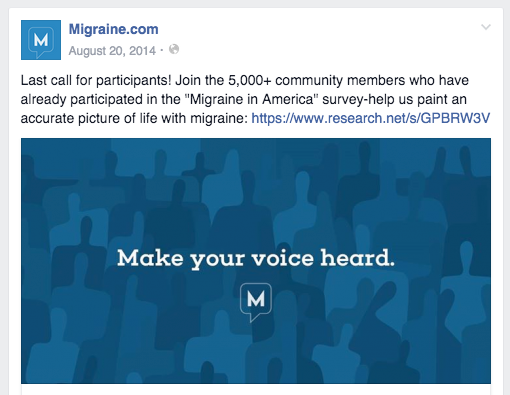Online Health Communities — Communities of Practice?
October 14, 2015
Stephanie Huston, Director of Community Development
Community, Social Community, Social Network, Community of Interest, Community of Practice, Virtual Community, etc. The list seems infinite. These terms are used almost interchangeably, but actually hold distinct meanings that can affect the way we as community managers approach each community type.
Let’s first call out the black sheep in the group — Social Networks. Social networks are different than social communities. Generally speaking, social networks do not have managers or moderators, as they are a platform for previously connected people to interact. These include LinkedIn, Facebook, etc. Social communities, on the other hand, are generally unknown individuals coming together to interact about a shared interest.
Within the realm of social communities, there are those that are offline and those that are online. Offline communities have been around for as long as life existed. Online communities are a quickly developing phenomenon catapulted by social networks.
For the purpose of this article, I’m going to be focusing on online (or virtual) social communities; specifically, Communities of Practice and Communities of Interest and where the health communities might fall.
Communities of practice began to emerge in the early 90s — the concept first being proposed in ’91 by a pair of cognitive anthropologists (2). The term refers to any group of people who share a craft and/or profession and presumably exchange experiences and information with one another in hopes of furthering personal development and practice. These differ from communities of interest, for which expertise and personal development are not the focus, but simply a shared interest. The below bullets may help elaborate the difference:
Online Communities of Practice
- A group of practitioners connecting around a shared topic of interest
- Individuals are typically looking to exchange best practices to improve the practice of the topic
- Ex: LinguaLeo.com, site devoted to learning English as a second language. Sermo.com, devoted to certified physicians focused on professional development
Online Communities of Interest
- A group of individuals connecting around a shared topic of interest
- Individuals are typically laymen, meaning they are not experts or professionals in the topic of interest
- Ex. Catster.com or Dogster.com, sites devoted to a community of cat or dog lovers respectively, Goodreads.com, Vampirefreaks.com
Online Health Communities as Communities of Practice
My initial reaction (as well as the reaction of many writers out there) would be to categorize an online health community (OHC) as a community of interest, as there is no authoritated level of expertise, nor are the members typically professionals who “practice” healthcare. But after further thought and consideration, I argue that the tacit knowledge shared amongst the members along with the social capital gained through that exchange of knowledge makes OHCs a unique example of the newly emerging virtual communities of practice.
A primary differentiator between communities of practice and communities of interest is the ineffable tacit knowledge they’re able to develop, share and store amongst community members. Tacit knowledge, unlike explicit knowledge, is based chiefly on personal experience and is difficult to aggregate and codify. The only real way to gain and share tacit knowledge is to practice what you preach. This, above all else, is why I believe that modern health communities are in fact, communities of practice. An individual with migraine can receive prescription meds from their physician, a detailed history of the first documented migraine from the internet, but can only learn that avoiding strong odors, or brushing their teeth with cold water might alleviate a migraine from other migraine practitioners like them — even if they are educationally amateur, they are experientially expert.
Managing the Online Health Community of Practice
As a manager of a community of practice, facilitating the sharing of tacit knowledge is key. Through shared knowledge, understanding, individual skills and common goals, social capital grows, which many argue is the glue that holds a community together (1). Because trust and empathy can be difficult to attain with an online community (as identification and personalization is limited) it is our job as managers to develop an environment that fosters trust, empathy and perceived contribution to a common goal, also referred to as generalized reciprocity (1).

One example of communities rich in social capital that clearly demonstrate generalized reciprocity would be the success of Health Union’s syndicated In America surveys. This unique initiative is a collection of comprehensive, condition-specific surveys with over 175 questions each. While individual community response differs, each of Health Union’s six established communities (Migraine.com, MultipleSclerosis.net,RheumatoidArthritis.net, Type2Diabetes.com, HepatitisC.net, COPD.net) has received completed responses from 2,000–4,000 individuals. As you can imagine, 2000 responses to 175 questions yields an unfathomable amount of insights.
So how, you might ask, does this demonstrate generalized reciprocity within a community rich in social capital?
Because not a single respondent is paid for completing the survey.
The individuals in each of these six condition-specific communities completes 175+ questions solely for the betterment of their community, for the benefit of people like them.
There remains a lot within this topic into which we could (and will) delve, but for now I’ll leave it with the claim that online health community managers should be approaching their communities as a community of practice, not simply interest, and to take note of the change in trust, empathy, and social capital that arises when you do so.
View the original article here.
1. Preece, Jennifer. “Tacit knowledge and social capital: Supporting sociability in online communities of practice.” Proceedings of I-KNOW. Vol. 3. No. 3. 2003.
2. Faraj, Samer, and Molly McLure Wasko. “The web of knowledge: An investigation of knowledge exchange in networks of practice.” Paper submitted for publication (2001).

